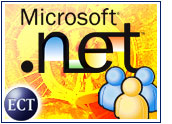
Continuing to dispel uncertainty over its dedication to open source, software maker Novell has released a road map for the Mono development project — an open-source effort to write Linux and Unix applications for Microsoft’s .NET framework.
Novell — which purchased Linux desktop maker Ximian last August and earlier this month announced its acquisition of SuSE Linux — published the Mono timeline, which indicates developers will get the first version of the tools in the second quarter of 2004.
But the release of the timeline, which roughly parallels Microsoft’s planned release of .NET servers, services and other related software, further solidifies Novell’s positioning to put together a complete Linux package.
“I think the SuSE acquisition gives a clear indication they would want to continue these projects,” Yankee Group senior analyst Dana Gardner told TechNewsWorld about Mono. “It really appears Novell is working toward an end-to-end Linux solution.”
Meaning of Mono
Novell said the Mono road map will help guide corporate developers and independent software vendors that plan to build .NET applications for different platforms and operating systems.
“To be successful, developers need a productive development environment, stable application programming interfaces (APIs) and a well-defined technology road map,” said Novell vice chairman in the Office of the CEO Chris Stone. “Mono provides all of this, plus the benefits of .NET for Linux and Unix.”
Yankee’s Gardner said corporate and independent developers might benefit from Mono by being able to port development efforts to other platforms to better deal with system heterogeneity.
Open Road
The Mono project, initiated by Ximian and programmer Miguel de Icaza, is intended to provide developers with tools and a mechanism to deploy .NET solutions on Unix and Linux systems. Components of the project include a C# compiler, virtual-execution system and class libraries such as ASP.NET and ADO.NET.
Mono 1.0, to be available by the middle of next year, is intended to help developers learn Mono and begin building .NET-compatible applications for Linux and Unix. Mono 1.0 will ship with .NET-compatible library profiles and will feature a code generator for x86 and PowerPC architectures. Support for other architectures — including ARM, Sparc, HPPA and s390 — will require an interpreter.
A subsequent stop on the road map — Mono 1.2 — is due toward the end of 2005 and will provide libraries for building graphical user interface (GUI) applications as well as initial support for the features in .NET 1.2, Novell said. The company claims more than 150 developers worldwide contribute to Mono.
Help or Hurt?
Gardner indicated that Microsoft’s embracing of the virtual machine allows for mixing and matching of proprietary and open-source software code, and said Mono makes complete sense from a computer-science perspective.
However, he added that the question of whether an open-source development alternative to Microsoft’s .NET makes business sense remains uncertain. The analyst also said Mono represents both help and hindrance to Microsoft’s efforts.
“In one sense, you could view [Mono] as helping them in that it might increase the potential market for .NET,” Gardner said. “But I would think Microsoft views it as competition in a business sense.”
Gardner added that Microsoft’s strategy is to offer so many integrated services with its .NET that it would be silly to go elsewhere for applications.
Total Linux
Aberdeen Group research director Bill Claybrook told TechNewsWorld that Linux servers and desktop software are likely to play off one another as Novell and others seek to sell complete solutions.
Gardner agreed and said he expects to see more activity from Novell as it works to create “a whole end-to-end Linux.”
“Linux across the kernel or across the data center can give you the same benefits of Java or other platforms, but you don’t have to be tied to one,” Gardner said. “You can use the best of Java, the best of Linux and, increasingly, the best of Web services.”
With Mono, users may be able to get the best aspects of .NET as well, Gardner added.











































